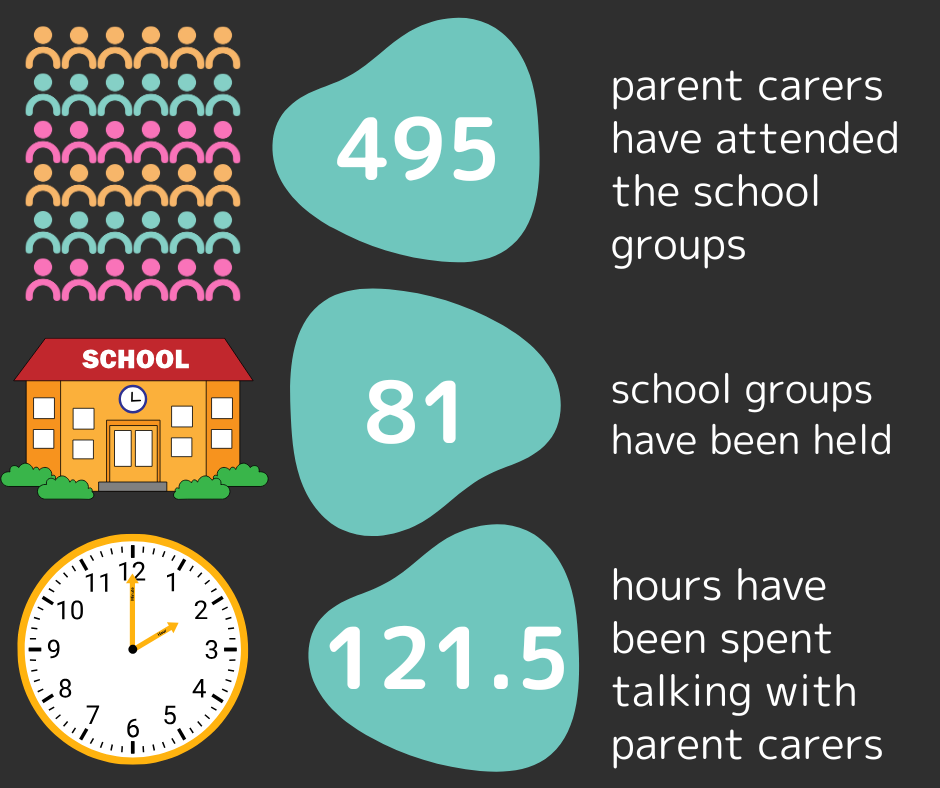The current school year is coming to an end, and we are holding the final groups for parent carers with children at schools involved in the Autism in Schools and Partnerships for Inclusion of Neurodiversity in Schools (PINS) projects.

These initiatives aim to improve school experiences for children and young people with SEND (special educational needs and/or disabilities). The projects are similar: they are both funded by the NHS and involve parent carer groups, and training and support for staff. The Autism in Schools (AIS) project also includes a programme working directly with pupils. There is a list of all the schools currently involved in both projects at the end of this page.
The numbers
Over the course of this school year and at the time of writing, the number of parent carers who have attended the groups is 495. We have run a total of 81 groups, across the 30 schools involved in both projects, which tots up to approximately 121.5 hours spent chatting with parent carers. This is incredibly important for us here at ESPCF; it has become a bit of a mantra to say that the best part of our work is connecting with others in the SEND community, but it’s true.
The messages
Exhaustion
The overwhelming theme is parent carer exhaustion and burnout. It is talked about at almost every session. Exhaustion felt by parent carers from caring for their child’s additional needs, the continuous learning about how to support them and trying to seek diagnoses and/or support – whether that be from school or services – or trying to increase the awareness and understanding of their child’s needs by others (e.g. immediate and extended family members, friends, school staff, services etc).
Many parent carers we spoke with are also very concerned about the effects on siblings and feeling guilty about this.
We have also had conversations about distressed behaviours which present as child-to-parent aggression and how families can be supported when this is happening.
Masking
Another big theme we’ve been hearing about this year is children masking in school and then parent carers managing the fallout from this at home. The projects have helped raise awareness of this in schools; feedback to SENCOs has helped emphasise that the way they respond either in person or in paperwork to the parent when a child masks has a big effect on the parent carer’s mental health, and/or on the child’s chance of receiving support.
Sensory issues
A large number of parent carers in groups have not been aware of, or are keen to know more about, how sensory issues affect their children and have an impact on dysregulation and behaviour that challenges.
Traits
There are also lots of parent carers who are seeking to understand better the apparently conflicting presentation of autism and ADHD, or the crossover of traits, or aren’t aware of PDA traits and strategies such as low demand or declarative language to support this.
Positive change
The support parent carers give each other at these groups is so important; it’s also imperative that something positive happens as a result. Here are some examples of the changes happening as part of both the projects, and the benefits being felt:
- Children in one school who had taken part in a pilot pupil programme (part of Autism in Schools – AIS) did a fantastic presentation for parent carers about neurodiversity and what it means to them. The children are ambassadors for neurodiversity within the school and have provided presentations in assemblies as well as to the year 2 cohort at the feeder schools.
- Working with another school, we have organised and facilitated a ‘Meet the SENCO’ group in the final term before summer, for the incoming year 7 cohort from the four primary feeder schools in the area. In fact, word got around about this, and parent carers from two other schools joined us as well! We were particularly keen to do this to help aid transition and provide consistency for families.
- One school wanted to update their end-of-year reports to be more SEN friendly, so one of our group sessions was dedicated to exploring ideas from parent carers to the SENCO on how to do this – a great example of co-production.
- We are in the process of analysing the surveys from the end of the first year of the AIS project. We’re pleased to say that the feedback provided by parent carers demonstrates that their confidence in the schools has increased. Where there are areas still requiring improvement, the feedback received is helping to inform upcoming training for the schools in the next academic year (alongside feedback from pupil and staff surveys). The surveys are also valuable because not only do they ensure accountability, we can also monitor what is and isn’t working well, and discuss this together with the schools and families.
- Parent carers have shared how helpful it is that we can signpost to services and resources that might not be known about. We’re able to provide information on things like the current eligibility criteria to access services, for example the Sleep Clinic.
- Parent carers have also said that an unexpected bonus of the school groups is that they are making connections with other SEND parent carers and sharing experiences in a non-judgemental, safe space.
- SENCOs at the schools involved have said that they have found the groups very helpful in understanding parent carer experiences. They say that because we (the ESPCF staff) are parent carers ourselves, with lived experience, it helps to bridge the gap between the school and the families, opening up conversations they otherwise wouldn’t have had.
- And on an individual note, the best feedback one of our engagement workers received at the end of a school group was simply a hug from another parent carer.
New schools and nurseries involved in the projects
At the end of 2024, three more schools joined the AIS project: The St. Leonard’s Academy and Bexhill Academy (both secondaries), and New Horizons (a special school).
More recently, the project has extended to include three early years settings: St Nick’s Nursery, Wallands Nursery, and South Malling Nursery – the latter two settings joining their primary counterparts already in the AIS project.
In June this year, we also received confirmation of the cohort of PINS schools for year two of the project (2025-26).
Here’s a full list of all the schools and nurseries involved in both projects.
Autism in Schools
Bexhill Academy
Gildredge House Primary School
Ocklynge Junior School
New Horizons Special School
Pashley Down Infant School
Priory Secondary School
South Malling Primary School
Southover Primary School
The St Leonards Academy
Wallands Primary School
Western Road Primary School
St Nick’s Nursery
South Malling Nursery
Wallands Nursery
Partnerships for Neurodiversity in Schools (PINS)
Year one of the project (2024-25)
Ashdown Primary School
The Baird Primary Academy
Bodiam CE Primary School
Brede Primary School
Buxted CE Primary School
Dallington CE Primary School
Danehill Primary School
Guestling-Bradshaw Primary School
Newick CE Primary School
Pevensey and Westham Primary School
Polegate Primary School
Ringmer Primary and Nursery School
Rotherfield Primary School
St Mary the Virgin Church of England Primary School
St Thomas a Becket Primary School
Willingdon Primary School
Year two of the project (2025-26)
Barcombe Primary School
Battle & Langton CE Primary School
Chyngton Primary School
Cradle Hill Community Primary School
Forest Row CE Primary School
Hamsey Community Primary School
Hollington Primary School
Iford & Kingston CE Primary School
Langney Primary Academy
Oakwood Primary Academy
Plumpton Primary School
Punnetts Town Community Primary School
Rocks Park Primary School
Salehurst CE Primary School
Stone Cross School
